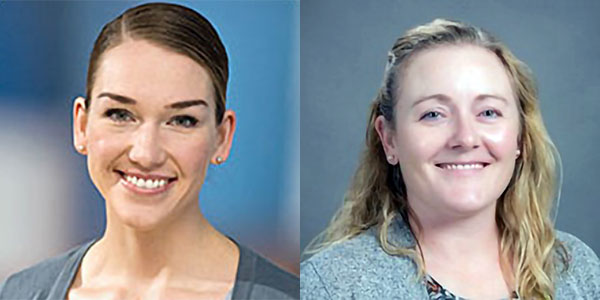When to request a Neurology eConsult: A Q&A with Dr. Jan Martin and Haley Sittner
Seattle Children’s Neurology began offering eConsults on March 27. We are excited to be able to offer this additional resource to community providers and their patients. Provider News sat down with Haley Sittner, a pediatric neurology advanced practice provider, and Dr. Jan Martin, a pediatric neurologist, to review some case examples and when to request an eConsult.
Q: Neurology recently went live with eConsults. Can you provide an example of some issues a community provider may see in clinic that would be good candidates for an eConsult to your team?

Haley Sittner, PA-C, MPAP (left) and Dr. Jan Martin, MD
Haley and Dr. Martin: In general, a good eConsult contains a clear clinical question that we can answer without needing a deep knowledge of the patient’s history. Here are a few examples for potential neurological eConsults:
Abnormal movements
Community providers may have questions about unusual movements in an infant. This is a great use of eConsults as there is opportunity to ask a clinical question and upload parent-recorded videos of the clinical events. We can provide guidance on whether the infant needs neurological evaluation or not, along with the urgency of the evaluation.
Tics
Within the context of involuntary movements, tic disorders are a common referral to Neurology and a great option for eConsults. Tics can be disruptive and uncomfortable to a child. The community provider may be unclear if these are tics or other neurological disorders. Or perhaps the community provider would benefit from treatment guidance for initial tic intervention. The eConsult process allows us to share treatment options along with the opportunity to refer for further neurological evaluation.
Headaches
Headaches are one of the most common neurological disorders in pediatric patients and can cause significant disability for the child. Similarly, headache disorders negatively impact quality of life and function for the entire family. It can be distressing to a family to hear that it can take months for their child to get a Neurology appointment. An eConsult allows an opportunity for a more timely review by a neurologist, with guidance and educational resources to support the community provider in their practice and to provide care to a child with a headache disorder.
Q: Conversely, what are some issues that you would consider urgent and appropriate for a call to your on-call provider?
Haley and Dr. Martin: Seizures are a common neurological disorder that needs more urgent evaluation.
For new onset seizures, we encourage providers to page our on-call Neurology provider. One example is for new onset seizures in infancy in the absence of fever, especially if there is associated developmental delays or regression. New onset of seizures in children, especially if explosive in onset with many seizures or prolonged seizures, certainly warrants a call to our on-call Neurology provider.
Other new or rapidly worsening symptoms that would be better served by a call to our on-call Neurology provider would include new weakness, sensory loss in an extremity or on one side of the body, or changes in mental status.
Community providers that need to reach our on-call Neurologist for an urgent clinical question can do so by calling 206-987-7777 and requesting they be paged.
Q: On that note, can you outline what happens when a community provider has an urgent question for our neurologists?
Haley: Urgent calls are currently handled by our on-call Neurology attending and advanced practice provider. They are also seeing urgent patients in clinic and covering patient issues for any Neurology providers who are out of the office, refills, triaging referrals, and other administrative tasks. When an urgent call comes through, we stop whatever we are doing, including excusing ourselves from a patient’s bedside, if needed, to ensure that urgent neurologic needs are met. If a concern requires immediate neurologic support, then please page the on-call neurologist. If, however, the concern could wait until the end of the day, or even for one to two days, an eConsult may be the more appropriate way of contacting us. We want to provide the highest quality of care to each of our patients and give the time and attention they deserve, so we want to stress the importance of differentiating between urgent and non-urgent when contacting Neurology.
Q: If a provider has referred their patient to Neurology but feels they need to be seen sooner than they are scheduled for, what should the referring provider do?
Haley: We use decision trees to determine medical urgency for patient appointments, so we aim to see all patients in the medically necessary timeframe. If you have questions, please review our Healthcare Professionals site for resources related to the referral and scheduling processes.